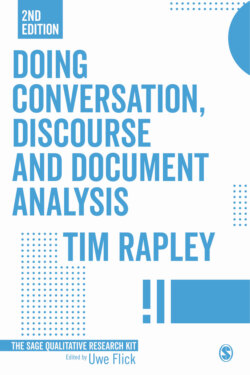Читать книгу Doing Conversation, Discourse and Document Analysis - Tim Rapley - Страница 12
На сайте Литреса книга снята с продажи.
Some thoughts on origins
ОглавлениеThere is no simple creation story about the birth and development of the study of discourse. Rather than see it as a single, unitary, approach to the study of language-in-use, we could see it as a field of research, a collection of vaguely related practices and related theories for analyzing talk and texts, which emerge from a diverse range of sources. It is often seen to emerge, in part, from the tradition of social constructionism. Vivian Burr (2015) offers four ideas that social constructionists often work with:
1 A critical stance towards taken-for-granted knowledge and understanding.
2 That our knowledge of the world is both historically and culturally specific.
3 That this knowledge is created, sustained and renewed by social processes.
4 That our knowledge and actions are intimately related and reflexively inform each other.
Put simply, our understanding of things, concepts or ideas that we might take for granted like ‘sexuality’, ‘madness’ or ‘instincts’ is not somehow natural or pregiven, but rather is the product of human actions and interactions, human history, society and culture. For example, why should childcare responsibilities be something that is tied to specific divisions of society – most often women? Is being a parent a set of practices, skills or resources that are somehow just innate to some divisions of society and similar throughout the globe, or is it culturally and historically specific? Is being a parent somehow only a product of genetics, biology or blood, or is it a set of social knowledges and actions that are practised, that we do parenting? Is our knowledge of being a parent something that all people just know or is this knowledge learned and generated in and through our interactions with others?
So social constructionism asks questions about everything we might take for granted – our identities, practices, knowledges and understandings. Such discussions do not necessarily have to lead us into debates about what is ‘real’ and what is not ‘real’. As Rose notes, ‘The realities that are fabricated, out of words, texts, devices, techniques, practices, subjects, objects and entities are no less real because they are constructed, for what else could they be?’ (1998, p. 168). It offers us a direction of research, one in which we take seriously how parenting (or gender, sexuality, ethnicity, facts, truth, and so on) is produced and negotiated, the practical, active, knowledge and action that is engaged in as part of our everyday lives, and take seriously the historical, social and cultural specificity of these knowledges and actions.
The study of discourse has also been influenced by other related theories and ideas emerging from such sources as linguistics, critical psychology, deconstructionism, phenomenology, poststructuralism, postmodernism, pragmatism, and writers such as Austin, Foucault, Goffman, Garfinkel, Sacks, Schutz and Wittgenstein (to name but a few). You also have a confusing array of contemporary research traditions that focus on, at some points, the analysis of language-in-use in talk and/or texts; this includes researchers undertaking:
Actor network theory.
Conversation analysis (which is seen by some as a ‘child’ of ethnomethodology).
Ethnomethodology.
Ethnography of communication (often connected to anthropology).
Critical discourse analysis (often connected to linguistics).
Critical psychology.
Discursive psychology (which used to be referred to as ‘discourse analysis’).
Foucauldian research (which also used to be referred to as ‘discourse analysis’).
Interactional sociolinguistics.
Membership categorization analysis (which is related to both conversation analysis and ethnomethodology).
Sociology of scientific knowledge (which is sometimes referred to as science and technology studies or social studies of science and technology).
Each tradition has its own assumptions about what counts as ‘appropriate data’ or ‘materials’ to do this type of work with and just how this type of work should be done. Also each tradition has its own terminology. For example, some people talk about ‘discourses’ whereas others refer to ‘interpretive repertoires’; similarly some talk about ‘identities’, others ‘subject positions’, and others ‘categories’ or even ‘membership categories’.
However you conceive of its origins, the best way to get a sense of understanding what the study of discourse is about is to go and read other people’s work. And unfortunately, there are no hard-and-fast rules or methods that are easily translatable into something that may look like ‘a set of hard-and-fast rules or methods’. One writer describes such work as ‘a craft skill, more like sexing a chicken than following a recipe for a mild chicken rogan josh’ (Potter, 2011, p. 189).
